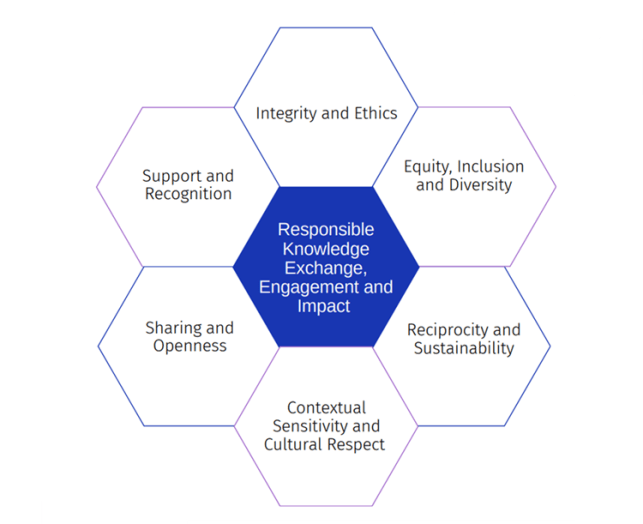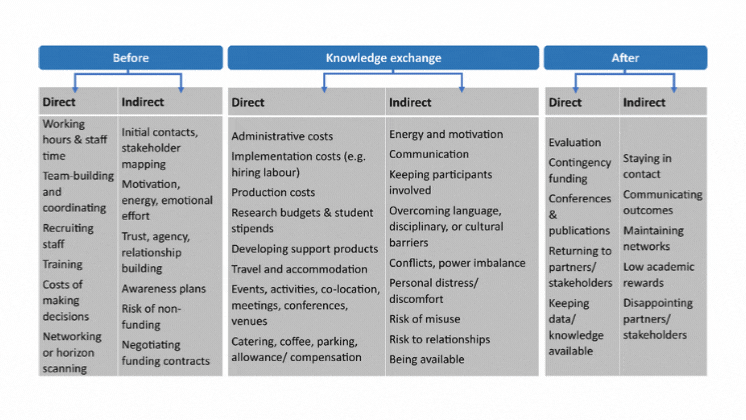Drawing on findings from The Responsible Knowledge Exchange, Engagement and Impact (2021-23) project, Alis Oancea, Aileen Marshall-Brown and Juliet Scott-Barrett outline six factors to consider when designing policies and practices to promote responsible Knowledge Exchange, Engagement and Impact.
Transparency, integrity and responsibility are intended to underpin all elements of research practice and almost all research projects are expected to undergo ethical review, yet when it comes to Knowledge Exchange, Engagement and Impact (KEEI), such considerations are sometimes neglected. Some standards exist (e.g. National Institute for Health Research UK Standards for Public Involvement; Forest Research Principles of Knowledge Exchange), although they are often discipline-specific and less visible than national and international initiatives focused more broadly on responsible research practices. The latter include, for example, the Australian Code for the Responsible Conduct of Research; The Declaration on Research Assessment (DORA); Declaration of Principles from the Foro Latino-Americano sobre Evaluación Científica; The Hong Kong Principles for Assessing Researchers; The Singapore Statement of Research Integrity; The Agreement on Reforming Research Assessment; Universities UK’s Concordat to Support Research Integrity), and the emphasis placed on equity in the recently released Cape Town Statement on Fostering Research Integrity through Fairness and Equity.
To address this gap, The Responsible Knowledge Exchange, Engagement and Impact 2021-23 (RKEEI) project was co-designed as a research-practice collaboration, and is co-led by the Department of Education and Social Sciences Division of the University of Oxford. The project has brought together, since October 2021, KEEI professionals and researchers in a series of workshops and interviews to conceptualise and support responsible knowledge exchange, engagement and impact practice and to co-create a resource and framework to support responsible KEEI practices.
Key insights from initial workshops
Table 1 offers a glimpse of some of the discussions from the first set of collaborative workshops with researchers and KEEI professionals. Four workshops have been conducted to date, complemented by fourteen interviews and document analyses.
Table 1: Key insights from initial workshops
Emergent Key Principles
On the basis of this work, we suggest that a framework for understanding and developing responsible RKEEI practice could include the following components (Fig.1):
Fig.1: Initial Conceptualisation of Key Principles in Responsible KEEI
1) Integrity and Ethics
First, Integrity and ethics are an important component, which ranges from broad commitments to values and principles, to very pragmatic and procedural concerns. For example, in many universities knowledge exchange and impact work is not necessarily subject to specific ethics procedures in the way that research data collection and co-creation undergo ethical review. Although ethical reflection may happen informally, or be prompted by KEEI partners, generally it is not supported by dedicated training and resources. There may be differences in how relevant parties define and prioritise ethical issues, notably in how training may be grounded in western knowledge systems. Responsible KEEI should be attentive to whether there is sufficient formal or informal reflection and scrutiny of ethical issues in setting up, conducting and drawing benefits from KEEI projects, as well as whose responsibility this reflection ought to be, and how it may be enabled and supported.
2) Equity, Diversity and Inclusion
Second, equity, diversity and inclusion has also been subject to limited review in relation to impact and KEEI activities. The need for fairness and equity in research collaborations has been highlighted powerfully, and we emphasise the need for greater focus and scrutiny of the power asymmetries and barriers that can exclude (or impede) different individuals and teams, as well as the need for more inclusive KEEI environments and systems.
3) Sustainability and Reciprocity
Third, it was striking how few of the policies, strategic documents and approaches we reviewed directly engage with issues of sustainability and reciprocity. There was little reference to meaningful and lasting benefits to the communities involved, the avoidance of negative externalities, or environmental sustainability. The latter is visible in the design of many KE projects, many of which still do not consider their carbon footprints. There also remains much to be learned about the reach, longevity and sustainability of community-based resources that may be shared in unequal relationships. Recognising the role that sustainability could play in engagement activities remains under-explored, although we note Chambers and colleagues’ mapping of different approaches to sustainability through co-production as a starting point.
4) Contextual Sensitivity
Fourth, consider contextual sensitivity, across different cultures, but also across the experiential contexts. What level of reciprocity is built into these interactions? What mechanisms of listening to or ‘reading’ contextual information are being put in place in KEEI activity and ensuring that practices respect principles of inclusivity and cultural safety? What interactions are respectful and meaningful to all those involved? How epistemically just are these interactions? Whose interests and whose worldviews and interpretive resources are being prioritised in selecting contextual information for action?
5) Sharing and Openness
The strong open knowledge agenda that applies to research and research processes does not extend in the same way, nor to the same extent, to knowledge exchange and impact practices. The Open Science Framework and Framework for Open and Reproducible Research Training provide excellent guidance and ideas for developing more accessible and inclusive research processes and engagement with knowledge. However, while some aspects of KEEI are amenable to open sharing, others might be entirely inappropriate. For example, many of our respondents raised issues around protecting the confidentiality of participants (including vulnerable participants and the organisations that support them), of commercial sensitivity, of competition, or of preserving relationships of trust.
6) Support and Recognition
From our own experience in scholarly and professional work, support for KEEI activity is unevenly distributed. KEEI contributions and workloads are also not consistently recognised. Moves towards narrative CVs and broader criteria for recruitment and promotion of researchers and for the assessment of research, may help address this issue to some extent, but they may not differentiate between more or less responsible KEEI practices. Further, much knowledge exchange and impact activity – even when it is recognised within the existing reward and recognition structures – may happen in a way that obscures ‘irresponsible’ practices. We invite reflection and dialogue on the kind of formative recognition that might encourage and sustain responsible engagement.
These components flag areas of discourse about KEEI that can be done more (or less) responsibly. They enable us to articulate positive meanings, identify generative practices, and encourage configurations of responsible thinking; and also to understand the risks, power inequities and potential for friction and conflict involved in KEEI, including the potential for divergent interpretations of these issues in a range of contexts. We are now developing these ideas into a fresh set of workshops, publications and resources and a follow-up project; please get in touch if you are interested in contributing or collaborating.
This research project is funded through the Higher Education Innovation Fund, ESRC Impact Acceleration Account, Wellcome Institutional Strategic Support Fund, and the Research England Research Culture Fund. This project has received ethical approval from the review committee of the Department of Education, a subsection of the University of Oxford’s Central University Research Ethics Committee (CIA-22TT-127).
We are sincerely grateful to our two previous Research Assistants, Szilvi Watson and Claire MacLeod, to our expert advisory group, and to our workshop attendees and interviewees for sharing their time, advice and ideas.
The content generated on this blog is for information purposes only. This Article gives the views and opinions of the authors and does not reflect the views and opinions of the Impact of Social Science blog (the blog), nor of the London School of Economics and Political Science. Please review our comments policy if you have any concerns on posting a comment below.
Image Credit: Jon Tyson via Unsplash.










